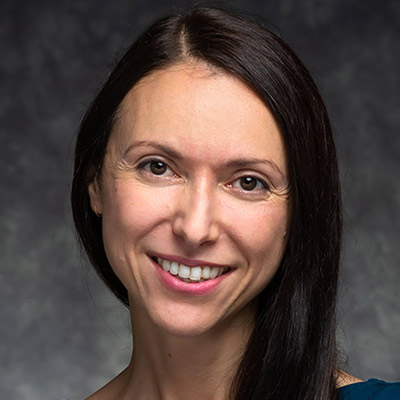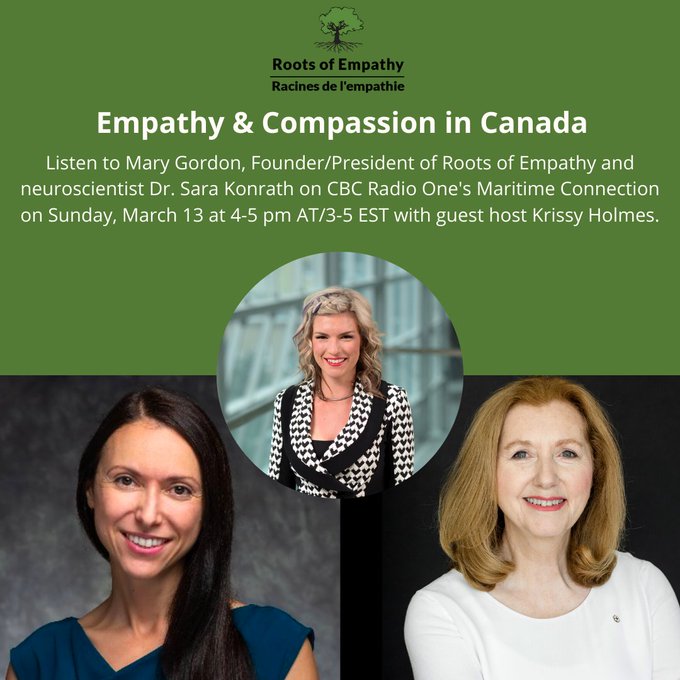Maritime Connection with Preston Mulligan
https://archive.org/details/me-and-pam-ross-on-maritiime-connection-march-13th
Me And Pam Ross On Maritime Connection March 13th
http://davidraymondamos3.blogspot.com/2022/03/covid-19-pandemic-has-brought-out-worst.html
https://twitter.com/DavidRaymondAm1/status/1503105831830798339
https://twitter.com/KrissyHolmes

St. John's NLcbc.ca/nlJoined May 2009
https://twitter.com/SaraKonrath


301 University Boulevard
Indianapolis, IN
46202
Education
- Honours B.A., Psychology, University of Waterloo, 2002
- M.S. and Ph.D., Social Psychology, University of Michigan, 2007
Biography
Sara Konrath is a social psychologist who directs the Interdisciplinary Program on Empathy and Altruism Research (iPEARlab.org) at the Indiana University Lilly Family School of Philanthropy. Her research explores changes over time in social and emotional traits among American young people.
Other research examines implications of these traits for individuals themselves and for other people. For example, she has published extensively on the health and happiness benefits of giving. She also creates and evaluates empathy-training programs for various groups, including young people, teachers, doctors, museums, and other organizations.
Dr. Konrath writes a popular Psychology Today blog (The Empathy Gap) and is regularly featured in media outlets, including the New York Times, Time Magazine, NPR radio, and BBC news. Her forthcoming book is called Culture of Burnout: American life in an age of increasing expectations (Oxford University Press). She is currently a Visiting Professor at the Notre Dame Institute for Advanced Study (2020-2021).
Courses Taught
- Quantitative Behavioral Research Methods
- Altruism & Health
- Psychology of Giving
https://philanthropy.iupui.edu/academics/faculty/index.html
Indiana University Lilly Family School of Philanthropy
IUPUI
University Hall, Suite 3000
301 University Boulevard
Indianapolis, IN
46202-5146
Phone: 317-274-4200
Fax: 317-278-8999
- Academic Programs and Student Services: 317-274-4200 or apsop@iupui.edu
- Development: 317-278-8918 or sopdev@iupui.edu
- Finance: 317-278-8945 or sopfince@iupui.edu
- International Programs: 317-278-8935 or sopintl@iupui.edu
- Lake Institute on Faith & Giving: 317-278-8998 or lfi@iupui.edu
- Marketing: 317-278-8934 or sopcomm@iupui.edu
- Mays Family Institute on Diverse Philanthropy: 317-274-4200 or maysfi@iupui.edu
- Media and Communications: 317-278-8972 or sopmedia@iupui.edu
- Office of the Dean: 317-278-5652
- Research: 317-278-8902 or soprsrch@iupui.edu
- The Fund Raising School: 317-274-7063 or tfrs@iupui.edu
- Women's Philanthropy Institute: 317-278-8990 or wpiinfo@iupui.edu
https://www.youtube.com/watch?v=CQ-q_PLNqCM&t=382s&ab_channel=IUPhilanthropy
Getting to know our faculty: Sara Konrath
https://twitter.com/MaryGordonROE
https://rootsofempathy.org/contact/
Mary Gordon, Founder/President
Contact Ivonne Guerra, Executive Assistant,
Office of the President,
iguerra@rootsofempathy.org
416-204-7895


https://www.cbc.ca/news/canada/pandemic-canadians-poll-attitude-1.6378018
COVID-19 pandemic has brought out the worst in people, pulled Canadians further apart, survey suggests
Findings based on survey carried out by the Angus Reid Institute, in partnership with CBC
Two years of living through the COVID-19 pandemic has left Canadians in a dour mood, with the majority saying the ordeal has significantly disrupted their lives, pulled Canadians further apart, brought out the worst in people and weakened their compassion for one another.
These are the findings of a new survey, carried out by the Angus Reid Institute, in partnership with CBC, which coincide with the two-year anniversary of the World Health Organization declaring the worldwide outbreaks of COVID-19 a pandemic.
The online survey polled a representative randomized sample of 2,550 Canadians 18 and over between March 1 to 4 of this year. For comparison purposes only, a probability sample of this size would carry a margin of error of +/- two percentage points, 19 times out of 20.
'Change for the worse'
"What we did is we asked Canadians to make their own assessments of how they see things changing," said Shachi Kurl, president of the Angus Reid Institute. "Did they change over the last two years?
"And there are some pretty significant takeaways around negative perceptions over that change. If there has been change, it's been change for the worse."
There were some positive findings. For example, a large majority of Canadians (70 per cent) said they are thankful to be living in Canada during the pandemic.
Has the COVID-19 pandemic brought people closer together or further apart?
The survey also suggested that the pandemic has made most Canadians re-evaluate their priorities, with just over 80 per cent saying it has made them reflect on what is really important in their lives. And just under half said they have since made significant positive lifestyle changes.
But as mandates begin lifting, hospitalizations drop and Canadians emerge from what may be the worst of the pandemic, the survey findings reveal a bleak assessment of the past two years, and in some categories, show that Canadians have a negative view of their fellow citizens.
About 41 per cent of Canadians say that since the pandemic, "life overall" is worse, compared to 23 per cent who say it is better.
Nearly half of those surveyed (47 per cent), said the overall impact of the last two years has been more bad than good, which includes one in 10 people who said these were the worst years of their lives.
Almost half (47 per cent) said the pandemic disrupted their lives in a "significant" way, and one in 10 described that disruption as "severe."
That disruption was felt most significantly by around two-thirds of men and women aged 18 to 34, compared to about half for those over the age of 54. Across the country, around 60 per cent of those surveyed in Alberta, Manitoba and Saskatchewan and nearly two thirds of those surveyed in Ontario said the pandemic significantly or severely altered their lives.
Has the COVID-19 pandemic brought out the best or the worst in people?
By several measures, the overall personal impact on Canadians has been more negative than positive, the survey found.
Physical, mental health decline
When asked whether their household financial situation is worse now — 37 per cent agreed, compared to 30 per cent who said it was better. But more than half said their physical and mental health is worse.
Relationships with friends and family took a significant hit, with 39 per cent saying they are worse, compared to 14 per cent who said they are better.
The pandemic disrupted the lives of Canadians in other ways as well. Seven in 10 Canadians had to postpone travel at some point during the past two years. Meanwhile, almost half were forced to delay medical appointments, while one-quarter delayed a more serious medical procedure or surgery, the survey found.
The pandemic also struck close to home for the majority of Canadians, with more than half (54 per cent) saying a close friend or family member has been infected with the virus. One-third said an immediate family member caught COVID-19 and one in five people were personally infected.
Meanwhile, most Canadians have little faith in how effectively the country would handle another pandemic, with 70 per cent saying Canada will struggle just as much if there is another global illness.
Overall personal impact of the COVID-19 pandemic
Answers to the prompt: "Describe the last two years for you."
Perhaps the pandemic's most significant impact on Canadian attitudes, according to the survey, is how it has left a vast majority with a pessimistic outlook on society as a whole.
Pandemic 'pulled people further apart'
Four out of five of those surveyed agreed that the pandemic has "pulled people further apart." And about the same number believe "the pandemic has brought out the worst in people."
Meanwhile, just over 60 per cent of those surveyed said the level of compassion Canadians have for one another is "weaker."
Kurl said the results of the survey reveal a marked difference in the attitudes of Canadians over this two-year span.
She said that according to data, Canadians had an absolute sense of common purpose at the onset of the pandemic, and said that people really approved of what they were being asked to do.
"When we see 80 plus per cent of people saying that the pandemic has pulled people further apart rather than brought them together, when we hear that almost the same number say that the pandemic has brought out the worst in people instead of the best in people, you really start to see that degradation, that breakdown of whatever sense of social cohesion we thought we might have felt this time two years ago."
With files from Thomas Daigle
CBC's Journalistic Standards and Practices
https://www.cbc.ca/news/canada/saskatchewan/relationships-covid-19-saskatchewan-1.6347569
How disagreements about COVID-19 have driven families, friends apart
'I don't get to talk to my baby brother anymore,' says Sask. woman
Warning: This story contains references to miscarriage/pregnancy loss
As Kristin Quinney cradled the body of the son she had lost to a miscarriage, her pain was magnified by the knowledge that she couldn't tell her family.
"I didn't think I could take hearing that I killed my child by getting vaccinated, which is what I thought that they would say," the 38-year-old from Martensville, Sask., said through tears.
By that time in September 2021, her relationships with her mother and especially her brother had already been estranged by the pandemic, particularly vaccination, Quinney said.
"I was really, really scared about their reactions and what they would say to me. I couldn't handle [it]. I mean, you're already feeling gutted."
Quinney, who already has two daughters, doesn't believe the COVID-19 vaccines had anything to do with her losing her son. She said miscarriages have been around throughout human history.
"But we don't talk about it very much."
 Kristin
Quinney lives in Martensville, Sask. She says disagreements about
COVID-19 have negatively affected the relationships with her mother and
brother. (Provided by Kristin Quinney)
Kristin
Quinney lives in Martensville, Sask. She says disagreements about
COVID-19 have negatively affected the relationships with her mother and
brother. (Provided by Kristin Quinney)
1 in 3 people say they reduced contact with someone over past year: survey
A recent survey by the Canadian Hub for Applied and Social Research (CHASR) at the University of Saskatchewan in partnership with CBC Saskatchewan found that more than 31 per cent of respondents had reduced contact with a friend or family member over the past year because of differing views or opinions.
Almost 94 per cent of those who had reduced contact said the split was caused by opinions about COVID-19.
Quinney said the relationship with her brother already had cracks prior to the pandemic due to different political opinions.
When things got worse because of COVID-19, she unfriended her brother on Facebook and blocked his phone number.
"I don't get to talk to my baby brother anymore because he couldn't agree that it was OK for us to have opposing views," she said.
Unexpectedly, the relationship between Quinney and her mother also started to get more complicated. The two women still have contact, but it is not the same anymore, said Quinney.
Even her two daughters know they should avoid the topic at grandma's house, she said.
"I'm very careful what I say and careful with my words. You know, you're always kind of walking on eggshells."
Quinney is "incredibly sad" about how these relationships have eroded.
The world is not black and white, says Sask. mother of four
To save the relationship with her son, Linda Osachoff had to acknowledge that the world is not black and white, and that people are not simply good or bad.
The 71-year-old said she raised her four children to become inquisitive and questioning.
When COVID-19 hit the province, Osachoff was surprised to find one of her sons having a very different point of view than her about the pandemic.
"This came as a shock," she said.
Osachoff lives with her husband on a farm in east central Saskatchewan, near the town of Canora.
Seeing the family drifting apart was an unexpected burden. Osachoff and her four children never fully cut each other off, but they did have to take a step back.
"We all took a pause to determine, first of all, whether or not this relationship was worth saving and whether or not there was a will on both sides to make that happen," she said.
"Then began a series of very dynamic discussions."
Osachoff tried to set aside her emotions toward her son, who she believed had turned against the way she raised him.
 Linda Osachoff and her husband Alfredo Converso live in east
central Saskatchewan, near the town of Canora. (Provided by Linda
Osachoff)
Linda Osachoff and her husband Alfredo Converso live in east
central Saskatchewan, near the town of Canora. (Provided by Linda
Osachoff)
This feeling is not unusual these days, according to Sarah Knudson, an associate professor of sociology at St. Thomas More College at the University of Saskatchewan.
People might be surprised, disappointed and confused when someone in their close circle disagrees with them on topics related to the pandemic, she said.
"Most people don't like dealing with conflict," said Knudson.
There is also a lot more pressure in society to not ditch a family member, she said.
"Whether it's fair or not, other people are going to look way more harshly on the fact that you're estranged from your own parent or child or closer family member."
Process of reconciliation
Osachoff said she had to ask herself where her son was coming from and why. Eventually the two agreed that their relationship was based on a very strong foundation.
"That's where the hard work really began," she said.
Mother and son agreed to some ground rules in their discussion. For example, it was important that each of them would feel safe in expressing their opinions. Even though Osachoff found her son's viewpoints disagreeable, she tried to listen with open ears.
Osachoff acknowledges that things are still not perfect and might not be for some time.
"Our relationships are stable," she said. "I think deep down, we've all made a commitment that we're not going to write each other off."
Many relationships in Canada have been affected by disagreements over the pandemic and how it should be handled.
In comparison to other global issues, COVID-19 is "in our face all the time," said Knudson.
"You can still go to the liquor store without confronting a climate change type policy, or at least not in an obvious way," she said.
"We're really at a point where we just can't escape [COVID-19]."
Band breaks up over vaccine disagreement
It is not only families that have been drifting apart because of disagreements about the pandemic. Terri Bear Linklater experienced this first hand.
The elementary school teacher and musician is from Muskoday First Nation — just over 20 kilometres southeast of the city of Prince Albert — but has lived in Saskatoon since she was a little girl.
Bear Linklater has lost people to COVID-19 and remains strong in her stance about how she wants to navigate the pandemic.
"I don't try to get into big debates about it," she said. "In fact, I just try to leave the conversations, like I don't want to talk about it."
 Terri
Bear Linklater is from Muskoday First Nation near Prince Albert. The
teacher and musician has been living in Saskatoon most of her life. (Terri Bear Linklater)
Terri
Bear Linklater is from Muskoday First Nation near Prince Albert. The
teacher and musician has been living in Saskatoon most of her life. (Terri Bear Linklater)
However, the topic brought an end to a very important project in her life.
As a musician, Bear Linklater has been involved with different bands over the years, and one of them was really starting to gain momentum, she said. The rock band formed in 2019, had since performed at events like Taste of Saskatchewan in Saskatoon and was starting to work on an album.
"Our songs were being played and people were wanting to hire us for gigs," said the musician.
"I thought we were doing really good stuff."
Things were going well until the group needed to find a new drummer. Bear Linklater said one person in the band was comfortable getting an unvaccinated musician on board while the others were not.
"That became a big problem and a big argument," she said.
Nobody was willing to budge on their stances and the band broke up.
Losing the group had a big effect on her.
"When you get into a band with people, you develop the relationships and then along with that, you know, you're developing your sound," she said.
"All that went out the window in a matter of hours."
The breakup though will not stop Bear Linklater from doing what she loves – making music.
"I've always been a really positive person, happy-go-lucky," she said. "And I will continue to be this way."
'You only get one set of parents': Quinney
Quinney, who disconnected with her brother about a year and a half ago, said their relationship has slightly improved.
They saw each other over the holidays and Quinney has unblocked his phone number, but she is still very guarded when they are together.
The connection with her mother was particularly strained after Quinney lost her son in the miscarriage. However, mother and daughter have moved through it since then, she said.
"Those are feelings that will never go away for me," said Quinney. "I'll never forget."
Quinney acknowledged that her mother is a good person and that the divisiveness has taken a toll on everyone.
Now she is just hoping to get some normalcy back in their relationship.
"You only get one set of parents," said Quinney. "And I love them."














No comments:
Post a Comment